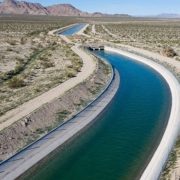April 20, 2023 – A federal report released today says near-record snowpack in the Colorado River Basin could raise the elevation of Lake Mead by more than 20 feet by the end of the year, providing a critical opportunity for water agencies to improve long-term management of the river.
The U.S. Bureau of Reclamation’s report shows vastly improved hydrological conditions are also expected to raise the water level in Lake Powell by more than 50 feet. California relies heavily on lakes Powell and Mead for water, as do Arizona and Nevada.
Despite the good news this year, the ongoing trend toward a hotter and drier climate means long-term solutions remain critical. About two-thirds of San Diego County’s supplies are conserved Colorado River water.
The San Diego County Water Authority supports a consensus-based approach for long-term solutions that uphold California’s high-priority water rights on the Colorado River.
“Today’s report is definitely welcome news and will buy us time to make crucial decisions,” said Dan Denham, the Water Authority’s deputy general manager. “It’s critical that everyone with a stake in the river – including the Bureau of Reclamation, basin states, tribes and Mexico – continue to develop real and lasting solutions for the river’s long-term operation.”
In its annual “24-Month Study,” Reclamation addresses changing conditions on the Colorado River and forecasts operations for the river system’s reservoirs for the following two years. Today’s report projects the above-average snowpack will help recharge the Colorado River. Up to 9.5 million acre-feet of water is expected to be released this year from Glen Canyon Dam into Lake Mead, an increase of 2.5 million acre-feet. That water could increase Lake Mead’s water level by more than 20 feet and break years of declines in the reservoir’s levels. Actual water releases into Lake Mead will be adjusted based on the observed inflow in Lake Powell.
Today’s study follows Reclamation’s April 11 release of a draft Supplemental Environmental Impact Statement that considers changes to near-term operations on the Colorado River, including potential reductions in water supplies for California and across the Lower Colorado River Basin. The draft analyzes two alternatives, plus a no-action alternative.
The Water Authority continues to collaborate with its partners on the Colorado River Board of California to ensure the state’s high-priority water rights on the river are upheld through the environmental review process.
“We are hopeful that Reclamation’s flow projections will materialize as expected,” Denham said. “At the same time, the Colorado River remains mired in decades of hot, dry weather that requires new thinking about water use and conservation across the Basin. As we work collaboratively to find consensus-based, long-term solutions that serve all water users, we will continue to advocate that any future actions uphold the Law of the River and California’s senior rights.”





